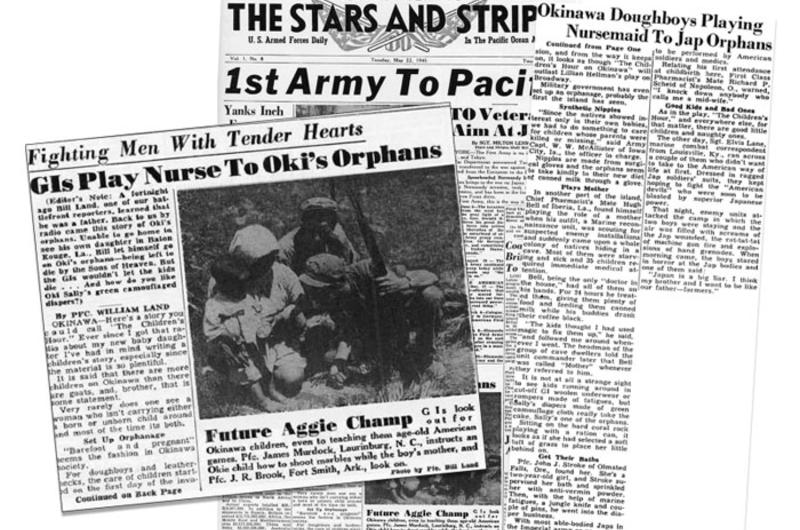

This website was created and maintained from May 2020 to May 2021 to commemorate the 75th anniversary of Stars and Stripes operations in the Pacific.
It will no longer be updated, but we encourage you to explore the site and view content we felt best illustrated Stars and Stripes' continued support of the Pacific theater since 1945.
Fighting men with tender hearts – GIs play nurse to Oki’s orphans

Stars and Stripes front page for May 22, 1945 - Pacific Edition.
By Pfc. Williams Land | Stars and Stripes May 22, 1945
Stars and Stripes presents these archive reports as they were written by the reporters in the field. The graphic and politically incorrect language used may be offensive to some readers. Researchers Norio Muroi and Catharine Giordano contributed to this archive collection.
Editor’s Note: A fortnight ago Bill Land, one of our battlefront reporters, learned that he was a father. Back to us by radio came this story of Oki’s orphans. Unable to go home to see his own daughter in Baton Rouge, La., Bill let himself go on Oki’s orphans – being left to die by the Sons of Heaven. But the GIs wouldn’t let the kids die… and how do you like Oki Sally’s green camouflaged diapers?
OKINAWA – Here’s a story you could call “The Children’s Hour.” Ever since I got that radio about my new baby daughter I’ve had in mind writing a children’s story, especially since the material is so plentiful.
It is said that there are more children on Okinawa than there are goats, and, brother, that is some statement.
Very rarely does one see a woman who isn’t carrying either a born or unborn child around and most of the time it’s both.
Set Up Orphanage
“Barefoot and pregnant” seems the fashion in Okinawa society.
For doughboys and leathernecks, the care of children started on the first day of the invasion, and from the way it keeps on, it looks as though “the Children’s Hour on Okinawa” will outlast Lillian Hellman’s play on Broadway.
Military government has even set up an orphanage, probably the first the island has seen.
Synthetic Nipples
“Since the natives showed interest only their own babies, we had to do something to care for children whose parents were killed or missing,” said Army Capt. W. W. McAllister of Iowa City, Ia., the officer in charge.
Nipples are made from surgical gloves and the orphans seem to take kindly to their new diet of canned milk through a glove.
Plays Mother
In another part of the island, Chief Pharmacist’s Mate Hugh Bell of Iberia, La., found himself playing the role of a mother when his outfit, a Marine reconnaissance unit, was scouting for suspected enemy installations and suddenly came upon a whole colony of natives hiding in a cave. Most of them were starving and sick and 35 children required immediate medical attention.
Bell, being the only “doctor in the house,” had all of them on his hands. For 24 hours he treated them, giving them plenty of food and feeding them canned milk while his buddies drank their coffee black.
“The kids thought I had used magic to fix them up,” he said, “and followed me around whenever I went. The headman of the group of cave dwellers told the unit command later that Bell was called “Mother” whenever they referred to him.
It is not at all a strange sight to see kids running around in cut-off GI woolen underwear or rompers made of fatigues, but Sally’s diapers made of green camouflage cloth really take the cake. Sally’s one of the orphans.
Sitting on the hard coral rock playing with ta ration can, it looks as if she selected a soft tuft of grass to place her little behind on.
Get Their Baths
Pfc. John J. Stroke of Olmsted Falls, Ore., found her. She’s a two-year-old girl, and Stroke supervised her bath and sprinkled her with anti-vermin powder. Then, with the help of marine fatigues, a jungle knife and couple of pins, he went into the diaper business.
With most able-bodied Japs in the Imperial army or navy there seems a definite shortage of obstetricians among civilians and therefore many deliveries have to be performed by American soldiers and medics.
Relating his first attendance at childbirth here, First Class Pharmacist’s Mate Richard P. Scheid of Napoleon, O., warned, “I knock down anybody who calls me a mid-wife.”
Good Kids and Bad Ones
As in the play, “The Children’s Hour,” and everywhere else, for that matter, there are good little children and naughty ones.
The other day, Sgt. Elvis Lane, marine combat correspondent from Louisville, Ky., ran across a couple of them who didn’t want to take to the American way of life at first. Dressed in a ragged Jap soldiers’ suits, they kept hoping to fight the “American devils” who were soon to be blasted by superior Japanese power.
That night, enemy units attacked the camp in which the two boys were staying and the air was filled with screams of the Jap wounded, the rat-tat-tat of machine gun fire and explosions of hand grenades. When morning came, the boys stared in horror at the Jap bodies and one of them said:
“Jap is a big liar. I think my brother and I want to be like our father – farmers.”


